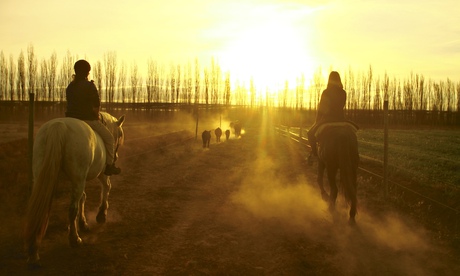
"Jalovik is a big village, but many houses are abandoned. A lot of land is left uncultivated. The elders died and the youth left. But these two came here ..." The two in question were Viv and Bou, the German-Dutch couple who owned the self-sufficient farm in rural Serbia where I was volunteering.
Our presence was baffling to our neighbour Marija, who would always visit just as we were about to sit down to eat, and deliver laments (translated by Viv) on the fate of Serbian peasantry. With the privilege of her advanced years, she would shout with emotion, and bang on the table. But she was not unwelcoming. "It is good as long as there are people here," she concluded.
The irony wasn't lost on me. While the youth of Jalovik tire of farm labour and dream of foreign cities, Brits volunteer to herd goats and hack potatoes out of cement-hard soil. Marija thought we were mad. Maybe she was right. I had ended up in Jalovik through a combination of poor organisation, serendipity and a website called workaway.info. Workaway is an online resource listing nearly 10,000 volunteer placements worldwide.
These can be arranged directly between workers and hosts, using profiles and references from previous Workawayers to assess compatibility. Placements last from a week to several months, and travellers get food and board in exchange for four or five hours' work a day (voulunteers pay for their own travel costs, visas etc).
I first found the site as a student on the cusp of a four-month summer break. The thought of a (nearly) free tour of Europe compared well with London rents and boring temp work. I sublet my room and had an offer within hours of sending my first email, from an Italian family looking for help with babysitting and light gardening.
A week later, I had a private room in a farmhouse overlooking the hills of Tuscany. My tasks included playing with two little girls, feeding the peacocks that paraded around the garden, and cleaning algae out of the natural swimming pool. Meals of homemade ravioli were eaten on a magnolia-draped veranda. My attempts at conversation, which started as Spanish with a pantomime accent, evolved into semi-competent Italian over carafes of montalcino wine shared with generous and engaging hosts.
My next attempt was less charmed. From picky beginnings (No expat hosts! No commercial enterprises! No tourism work!), I adjusted my requirements to "anyone who'll have me". "Anyone" turned out to be Ben, a British hostel owner in Berat, Albania, a conscientious guy who didn't want to undermine the local economy. He paid locals for cleaning and maintenance work and recruited volunteers to chat up the guests. By getting guests talking and drinking, the hostel's reputation for being "homely" and "lively" could be kept alive on the backpacker trail – as well as keeping the bar takings up.
When several Workawayers in succession failed to turn up, Ben was left to fill this role alone. When I arrived, he had been discussing the relative merits of Balkan tourist sites over shots of rakı until 3am every day for three weeks and seemed close to collapse. Within a week, I sympathised – there are only so many times you can laugh at tales of vomiting escapades in Corfu. By the time I got another offer and headed for Serbia, 10 hours a day of farm work came as a relief.
In Jalovik I learned to milk goats, make cheese and yoghurt, grind corn and bake bread in a woodburning oven. Armed with a spade, I joined the villagers to battle a corn fire that threatened to engulf a neighbouring farm. I began to appreciate the bigger picture that Workaway offered: the chance to share someone else's reality by telling stories, exchanging skills and immersing yourself in daily lives.
Whether to work for free or not is a delicate question. The line between exchange and exploitation can be a fine one and communities can lose out on paid employment. But if done sensitively, I can think of few forms of travel that offer such a window into lives and histories.
Learning from last year, I have drawn up a route for this summer, on projects that intrigue, inspire or amuse me. The route takes in North Africa, Europe and the Middle East; first stop: Morocco's Rif mountains.
• Read about Cat's experience helping to build an adobe house in Morocco on 26 July

